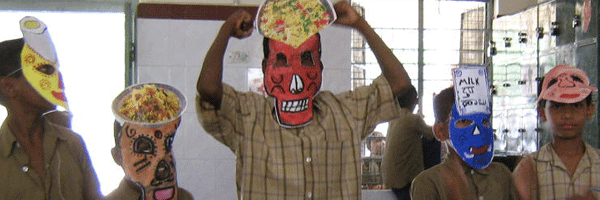|
Our work and programmes
|
| Social education programmes |

 Government shelter for children: Boys Home Programme
This is a shelter run by the Government for children who have been rescued from abusive employers, who have run away from home, who are addicts or have been caught committing petty crime. The home it self is a pretty bleak and depressing place, where children are routinely locked up and provided with limited food, medicine and counselling. Our volunteers visit the Boys Home everyday, providing a vital lifeline for these children, by providing them with crayons, play equipment, a reading room, books, excursions to parks, soap, towels and other necessities for a small window into a normal childhood. Most importantly, our volunteers provide love and routine in the chaotic lives of these children.
We desperately need volunteer and material help.
Read more
 Government rural schools: Reading room programme
The idea is to document the changes we've noticed and then petition the Government, with its vast resources to provide what we as a small organisation with limited resources and volunteer help have been able to provide.
The reading room programme is an important aspect of the Government rural schools initiative, establishing a space for the children's creativity and imagination and providing a foothold into the school for further work there. To date, Peace Child India has established a successful reading room in 25 schools.
Read more |
|
| Social medicine |
 The Health, Nutrition, Hygiene Programme
- First-aid awareness
The first-aid component aims at conducting training workshops held in government schools and in slums to make young people in impoverished and neglected communities aware of proper emergency-response methods.
Medical boxes containing first-aid supplies will also be donated so that a simple clinic can be set up in each school or slum.
The workshops include easy-to-understand information material, including posters and pamphlets, that are left at the clinic.
The workshop participants become informed about how to best treat themselves and their community members in case of accidents. This is especially important in rural villages where the nearest hospital or clinic is beyond walking distance, making it quite difficult to carry seriously injured victims.
The participants are appointed as members of their first-aid team, in charge of maintaining the first-aid clinic and restocking supplies when they are running low.
- Hygiene/nutrition
The newly added second phase of the project encompasses hygiene and nutrition, which is meant to compliment the first-aid training.
It aims at informing young people about simple and practical ways to incorporate proper nutrition and hygiene into their everyday lives. This will include actions as simple as hand-washing and wearing shoes, especially around toilets.
The project also covers advice on balanced eating, exercise, and reproductive health information for adolescents. Each workshop is specifically catered to appropriately match the needs of the specific age group targeted.
Read more
|
|
| Social entrepreneurship |
 Peace Child India cooperatives Peace Child India promotes handmade paper and Khadi* products, as a means of providing a sustainable income to economically and socially mariginalised communities.
Peace Child India has set up two co-operatives.
One is for the women from the village of Doddabele off Mysore road. The women make cloth bags and beautiful candles.
The other co-operative is for the women of the migrant community in Rajarajeshwarinagar. The women here make greeting cards of handmade paper and cloth folders.
Arthaa is a range of these products made by women and young people from the slum and migrant community. These young women have received little of no formal education, and are expected to work from a young age in order to provide for their families.
Our project aims to train them in employable skills, and to provide them with a sustainable and fair wage for their labour. We aim to empower these women to become more self sufficient.
*Khadi is hand spun cotton of historical and national interest to India
Read more
|
|
| How do we fund these programmes and support our work? |
 Approach to funding
Peace Child India receives a small monthly maintenance from Peace Child International in the UK. Apart from this maintenance, we realised early in on that relying on external funders is an unsustainable way to function, as funds are often stopped or reduced due to the inability of the funder, their changed priorities or a change in their area of operations. Sometimes it could just be the end of a particular funding programme. To counter this, and also not to have the burden of professional fund-raising services, Peace Child India evolved to become a social enterprise in its own right, raising funds through organising work placement and tours for paying volunteers.
 Three parts rule
The money raised is divided into three parts. The first part is used as part of project costs to make sure that the project can be completed. The second part is used to cover intern, school/tour group board, lodging and travel costs. The third part is used for operations, resources and staff costs towards the project.
In this way, we ensure that projects are sustainable and can be completed, without relying on external aid.
 Project support goes solely to the projects
None of the money raised in this way is used for anything other than the project the money was raised for. Peace Child India has a strict rule of using project funds raised for specific project for the project itself and not anything else, however pressing other issues might be. |
|
 Peace Child India
Peace Child India Peace Child India
Peace Child India